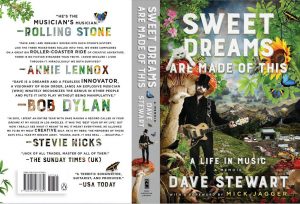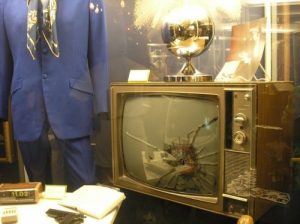by Jochen Markhorst
 Dave Stewart’s autobiography Sweet Dreams Are Made Of This (2016) is a double-minded affair, and in line with the image that even a less knowledgeable music connoisseur has of the man: colourful, unruly, creative and well, yes, a bit annoying, at times. The photo collage on the cover is conclusive. Throughout the book, Stewart profiles himself dozens of times as an immigrant in Alice In Wonderland, mushrooms play a leading role in drug-related anecdotes, more than once, and the man’s hippie-like naivety, whether feigned or not, is predominant.
Dave Stewart’s autobiography Sweet Dreams Are Made Of This (2016) is a double-minded affair, and in line with the image that even a less knowledgeable music connoisseur has of the man: colourful, unruly, creative and well, yes, a bit annoying, at times. The photo collage on the cover is conclusive. Throughout the book, Stewart profiles himself dozens of times as an immigrant in Alice In Wonderland, mushrooms play a leading role in drug-related anecdotes, more than once, and the man’s hippie-like naivety, whether feigned or not, is predominant.
The Dylan fan’s curiosity is sparked by the superlative recommendation by the old master on the back cover: “Dave is a dreamer and a fearless innovator, a visionary of high order, [and] an explosive musician [who] innately recognizes the genius in other people and puts it into play without being manipulative.”
Big words. But Dylan does know the man quite well, since a first collaboration in ’84. In the late 1980s, the occasional group Traveling Wilburys gathers in Stewart’s garden, the first record is recorded in his home studio. There is a click between the two rather different characters and Dylan will call on Stewart’s talents a few times. For example to produce a number of video clips, “When The Night Comes Falling From The Sky”; the hypnotic “Blood In My Eyes”; and “Emotionally Yours”. The latter has acquired some cult status because Dylan actually sings lip-synchronous playback, while playing with conviction an acoustic guitar that most certainly is not on the recording. He does sit at a piano though, on a piano stool, but stubbornly remains with his back to that piano, of course.
In the meantime, the two musicians also look each other up privately, and one of the stories that ensue is set in London:
“One day I took Bob to Speakers’ Corner in Hyde Park, where people stand on boxes and rant about whatever they want. Bob wore his jacket hood up so no one could recognize him, and he enjoyed being in the crowd, listening to the different speakers, even joining in, asking questions. He wrote a song about it when he got back to the hotel. It’s called T.V. Talkin’ Song.”
In an interview with USA Today (August 1990), Dylan already reveals that the song “is based on a speech” he heard at Hyde Park, so Stewart confirms that story. That reading is also consistent with the somewhat isolated position of the song in Dylan’s catalog. As a rule, we rarely see Dylan fulminate against such a relatively volatile carrier of culture like television, and it has also been a long time since the poet put an anecdote to music. The form is appropriate then, of course; his last talking song was about 25 years ago.
The speaker at Speakers’ Corner has struck a chord with Dylan, that much is clear. Although the poet has rarely commented on the phenomenon of television in his work, and certainly not on its possible objectionable influence, he speaks out quite regularly in interviews.
“TV is so super powerful. It forms people’s opinions. When I was growing up, and even in the sixties, that never was the case. You had to go out and experience things to form opinions. Now you don’t have to move. You get knowledge brought in to you, you know, without the experience of it. So I think there’s something really dangerous in that.” (Boston Review, April ’86)
And at a press conference in Rome, July 2001, the master even looses his cool and agrees, not entirely traceable, with a provoking journalist that TV and media have killed poetry and literature.
“And movies and TV. I mean, you can’t see more horrific things than you see in the media, especially in the news. I’m just talking about the news department, which is showing people absolutely everything they’d ever even dreamed about. Even thoughts they might think and suppress forever, they’d see them in the media. So you can’t express them anymore.”
In any case, both outpourings illustrate a dystopian world view, a paranoia that is characteristic of a major part of the speakers who climb the soapbox in Hyde Park. In the song, however, Dylan remains at a critical distance. The poet is a conduit for someone else’s worldview, avoids sharing his own opinion (“my thoughts began to wander” even suggests that he is only mildly fascinated) and serves a not unamusing ironic punch line in the closing line.
The most famous line is the line about Elvis. “Sometimes you gotta do like Elvis did and shoot the damn thing out.” It refers to an urban legend which is so stubbornly cultivated that it is now incorporated into the cultural baggage of the well-read American. In 1974, Elvis, in his suite on the top floor of the International Hotel in Las Vegas, is said to have shot a bullet through the screen as he saw the hated Robert Goulet. The successful baritone actor/singer is said to have stolen Elvis’ then-girlfriend Anita Wood in the 1950s, that’s why. Graceland sources later reveal, after Elvis’ death, that this is not uncommon.
 The King shoots televisions to pieces all the time. Mysterious is the addition by spokesman Kevin Kern, at the opening of the exhibition Elvis After Dark (March 2006), which shows such a shot TV set: “This is the only surviving television or appliance that Elvis shot out that was kept.”
The King shoots televisions to pieces all the time. Mysterious is the addition by spokesman Kevin Kern, at the opening of the exhibition Elvis After Dark (March 2006), which shows such a shot TV set: “This is the only surviving television or appliance that Elvis shot out that was kept.”
“Or appliance”? Did Elvis also shoot vacuum cleaners, ironing-boards and juicers? Intriguing, but we don’t get any answers.
The master is reasonably content with “T.V. Talkin’ Song”. Unlike the esteemed ladies and gentlemen-critics, who in general ignore the song in the often disappointed reviews of under the red sky. In particular “Wiggle Wiggle” is targeted, but the rest of the album does not receive much affection either. Dylan, however, clings to it. Unmoved, he continues to play most songs. The detested “Wiggle Wiggle” more than a hundred times, the title song “Under The Red Sky” is on the playlist until 2013 and also “T.V. Talkin’ Song” is still performed twenty times in 1990. He never announces the song, but after the very last performance, November 18 in Detroit, he does make a final statement: “That’s a song of social comment.”
T.V. Talkin’ Song (outtake):
https://www.youtube.com/watch?v=_a_ZPHNbfbc
What else is on the site
You’ll find some notes about our latest posts arranged by themes and subjects on the home page. You can also see details of our main sections on this site at the top of this page under the picture.
The index to all the 597 Dylan compositions and co-compositions that we have found on the A to Z page.
We also have a very lively discussion group “Untold Dylan” on Facebook with over 3300 active members. (Try imagining a place where it is always safe and warm). Just type the phrase “Untold Dylan” in, on your Facebook page or follow this link
If you are interested in Dylan’s work from a particular year or era, your best place to start is Bob Dylan year by year.
On the other hand if you would like to write for this website, please do drop me a line with details of your idea, or if you prefer, a whole article. Email: Tony@schools.co.uk
And please do note The Bob Dylan Project, which lists every Dylan song in alphabetical order, and has links to licensed recordings and performances by Dylan and by other artists, links back to our reviews

The poet is a conduit for someone else’s point of view –
So ofter missed by analysts of Dylan songs
Thank you for many interesting information. TV talking song I heard for the first time, great !!
We are actively promoting a link to this interesting topic on The Bob Dylan Project at:
https://thebobdylanproject.com/Song/id/608/TV-Talkin-Song
If you are interested, we are a portal to all the great information related to this topic.
Join us inside Bob Dylan Music Box.